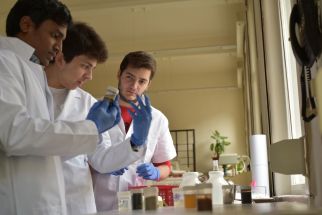 The Faculty of Environmental Protection Technology (FTOP) focuses on the issue of environmental protection. In 2019, FTO gained 2nd place in the "Faculty of the year" in the Chemistry category.
The Faculty of Environmental Protection Technology (FTOP) focuses on the issue of environmental protection. In 2019, FTO gained 2nd place in the "Faculty of the year" in the Chemistry category.The Department of Sustainable Fuels and Green Chemistry
The Department of Sustainable Fuels and Green Chemistry focuses on several areas in its pedagogical and scientific-research activities. It deals with topics that currently resonate in public and professional discussion, such as: alternative fuels and biofuels, whether gaseous or liquid; implementation of green chemistry principles in the chemical industry or air protection and climate change. We focus in detail on the conversion of biomass and waste plastics into bio-liquids and their subsequent hydrogenation treatment, the development of heterogeneous catalysts, the application of hydrogen, biogas, and bio-methane in the gas industry, the capture of carbon dioxide in order to mitigate climate change and the monitoring of air pollution. Furthermore, at the department, we deal with innovations and optimizations in traditional areas, especially in oil technology and analysis.

